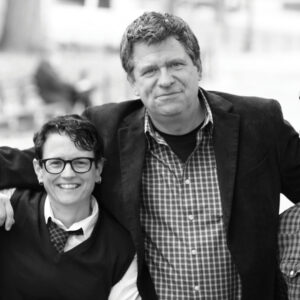Share This:
January 5, 2015 | Theatre,
A New Year: The Arts for Everyone
When David Dower and I met in 2002 we were both running play development organizations—David in San Francisco and me in Minneapolis. We met at a conference focused on developing new works for the stage—what we both did for a living—and we immediately connected over a sense of shared values. David and I bonded instantly over concerns about how to properly care for our artists behind those new works, most of whom were underpaid, without health insurance, struggling to find a way to access the profession. We were asking how to create a more accessible and equitable profession for everyone.
 Then, almost at the same time, we both moved from behind the scenes, artist-driven institutions to large theaters with substantial audiences—David to Arena Stage in DC and me to Steppenwolf in Chicago. There we each widened our vision for the profession and began to focus on both artists and audiences. I became engaged with the work Steppenwolf was doing at that time to create a “public square” for civic dialogue around the work on stage. David created the American Voices New Play Institute to embed playwrights in theaters and give them full-time salaries, putting them in regular conversation with audiences. And during all of this time we were talking regularly to each other, obsessed over one big idea: how to make theater an art form that everyone could access, artists and audiences alike.
Then, almost at the same time, we both moved from behind the scenes, artist-driven institutions to large theaters with substantial audiences—David to Arena Stage in DC and me to Steppenwolf in Chicago. There we each widened our vision for the profession and began to focus on both artists and audiences. I became engaged with the work Steppenwolf was doing at that time to create a “public square” for civic dialogue around the work on stage. David created the American Voices New Play Institute to embed playwrights in theaters and give them full-time salaries, putting them in regular conversation with audiences. And during all of this time we were talking regularly to each other, obsessed over one big idea: how to make theater an art form that everyone could access, artists and audiences alike.
We both worried that theater was becoming a form of culture and entertainment that only the few could afford and that we were making theater for those who already knew where to find it. We were concerned that “memberships” and “subscriptions” created an elite group of patrons inside of our institutions instead of creating a broad sense of community participation inside our spaces and programming. We’ve continued to think about how to make institutions of inclusivity.
David and I are community organizers at heart, both devoting our early careers to causes of economic and social justice, we both see theater as a force for good, as an opportunity to democratize access to culture and to support civic transformation. When we were in conversation with ArtsEmerson Founder, Rob Orchard, to come to Emerson College to do our work we talked at length about the ethical frame we wanted to try to create and live inside of. It was this conceptual and one might even say spiritual connection (that happened over a long lunch in October of 2011) that inspired Rob to invite us here. Rob was working inside a similar set of values and needed additional collaborators to bring an ambitious vision to reality.
Soon after David and I arrived we worked with Rob and the entire staff of the Office of the Arts to create an organizational values statement. We all agreed that we operate from the assumption that the arts belong to everyone. Every decision we make, every new programming choice and operational strategy, emerges from that conviction. And that our values include responsible stewardship of our spaces, diversity in all of its forms, a respect for the relationship between artistic excellence and social conscience, and an embrace of our role as a citizen of the city of Boston helping to build and sustain its civic infrastructure.
As we enter 2015 and David and I step into this new leadership role you will be seeing some changes in how we approach the road ahead, all changes that come out of the work and research we’ve been doing all along. We will revisit what it means to be a Member of ArtsEmerson. We will ask: how can membership be something that builds community, rather than creates privileges? We will revisit ticket pricing with an eye toward less expensive tickets and fuller houses of audiences that represent every neighborhood in the city of Boston. We will continue to develop our Seats Lab, a research project that uses a percentage of our theater seats to experiment with ways to bring our neighbors who don’t yet regularly attend theater into the conversation. Immediately you will see that we are getting rid of our ticket fees for ArtsEmerson productions as a way of creating a more authentic relationship to our customers and reducing barriers to access.
We’re serious when we say that we think the arts are for everyone. And please know we are just at the beginning of our exploration of ways to make this vision of inclusivity a reality. We welcome your ideas along the way!




Leave a Reply